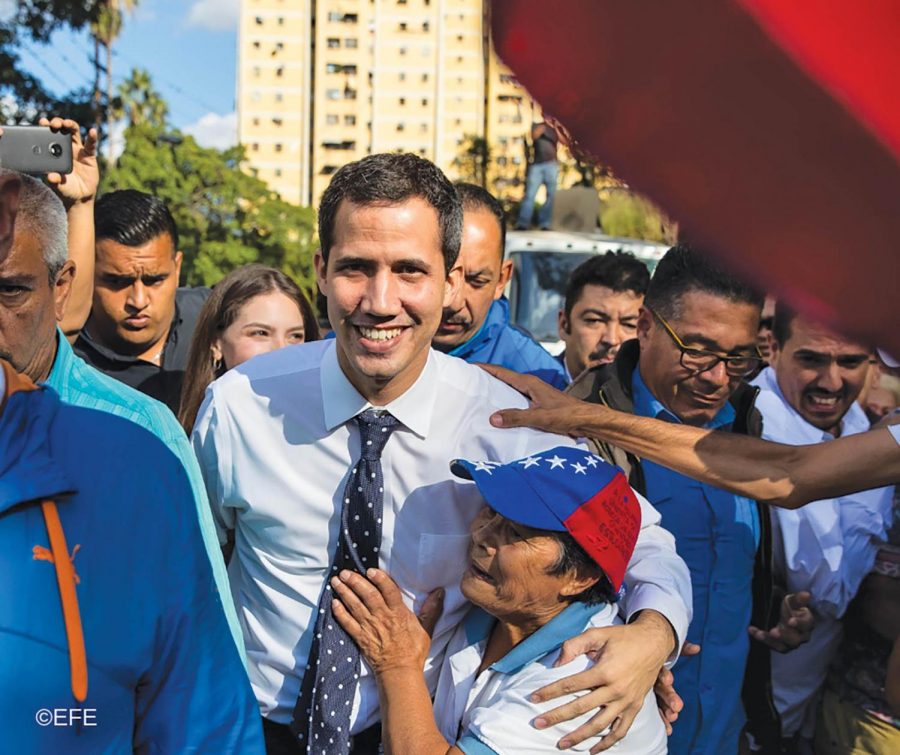U.S. military intentions don’t serve to benefit Venezuela’s people in crisis
Guaido’s refusal to participate in the democratic process didn’t sway the U.S.’s opinion of the candidate.
Yet again, the United States has wedged itself into a situation, which is strictly none of its business. For multiple years now, Venezuela has been descending into crisis. The origins of the economic crisis and the internal political turmoil are complicated and often disputed by each side, but this article by professor Gabriel Hetland of SUNY Albany breaks it down nicely. It isn’t worth getting into all of that when the main issue the U.S. has gotten itself involved in is very simple.
The president of Venezuela, Nicolás Maduro, recently won re-election and was sworn into office on Jan. 10. A few days later, opposition leader Juan Guaidó, the president of the Venezuelan National Assembly, swore himself in as the interim President of Venezuela because he saw Maduro’s re-election as fraudulent.
Although the Democratic Unity Roundtable, which Guaidó is a member of, acts as an official opposition coalition to Maduro, they have cleverly refused to have candidates participate in the 2018 presidential election because they thought it wasn’t going to be an honest election.
Shortly after Guaidó swore himself in as interim president, the United States declared him to be the legitimate leader which will bring democracy to Venezuela. So, essentially the U.S. just backed a guy who refused to participate in the democratic process of the presidential elections as a legitimate opposition candidate.
Instead he just swore himself in unelected and the U.S. just came along and said “Yes, this is real democracy at work.” The Organization of American States, which includes the vast majority of North and South American nations, also recognizes Guaidó.
In response to the United States recognizing Guaidó so quickly, Maduro cut all diplomatic ties with the U.S. and demanded that all American diplomats leave the country within 72 hours. Secretary of State Mike Pompeo responded to this demand by announcing that the U.S. wouldn’t be complying with Maduro’s demands because he’s not the real president of Venezuela anymore and Guaido welcomed U.S. diplomats to stay.
Of course, with the United States being the greatest military power on Earth, Maduro had to back down from his demands and allowed U.S. diplomats to stay. He essentially had to decide between potentially causing an all out war with the U.S., or undermine his power and claim to the presidency by backing down. Surely, his decision to back down has saved the lives of thousands of Venezuelan civilians by deescalating with the United States at his own expense.
While our surface level argument for intervention in this conflict seems very principled and moral, seeing as all we want to do is protect human rights and democracy, our real intention is to take over Venezuelan oil. Protecting its oil interests in Venezuela has been a long term goal of the U.S. since they have the largest oil reserves on the planet.
With oil production decreasing as the country has fallen into crisis, it only makes sense that the United States would want to take control and increase exports. President Trump has been very vocal about his desire to “take the oil” from oil rich nations like Iraq and Libya.
This presidential crisis acts as a perfect way to ensure the Venezuelan oil fields get privatized and sold to U.S. oil companies, much like what happened in Iraq after the overthrow of Saddam Hussein.
Coincidentally, seizing control of oil fields, and eventually privatizing them (along with all publicly owned industries) is on the top of the Venezuelan opposition’s to do list. In their transitional government law, the opposition specifically states that, “Public companies will be subject to a restructuring process to ensure its efficient management and transparency, including through public-private partnerships.”
As Americans we need to stand up and say no to the interventionism which our government and economic elites love so much. It does nothing to help us, and it certainly isn’t in the best interests of the Venezuelan people.







